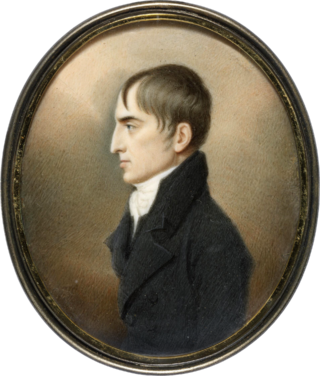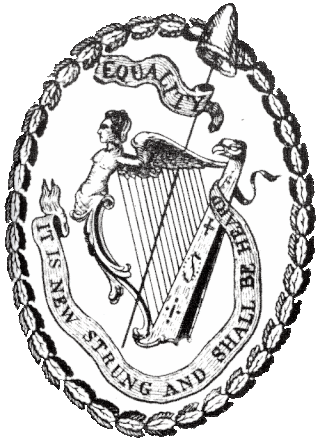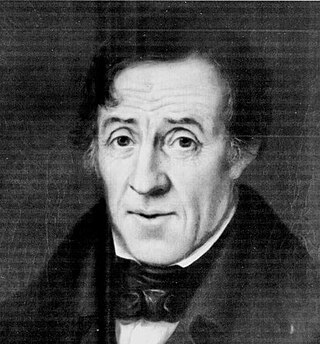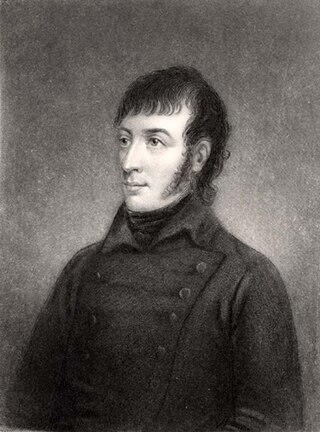Related Research Articles

Robert Emmet was an Irish Republican, orator and rebel leader. Following the suppression of the United Irish uprising in 1798, he sought to organise a renewed attempt to overthrow the British Crown and Protestant Ascendancy in Ireland, and to establish a nationally representative government. Emmet entertained, but ultimately abandoned, hopes of immediate French assistance and of coordination with radical militants in Great Britain. In Ireland, many of the surviving veterans of '98 hesitated to lend their support, and his rising in Dublin in 1803 proved abortive.

Theobald Wolfe Tone, posthumously known as Wolfe Tone, was a revolutionary exponent of Irish independence and is an iconic figure in Irish republicanism. Convinced that so long as his fellow Protestants feared to make common cause with the Catholic majority, the British Crown would continue to govern Ireland in the interest of England and of its client aristocracy, in 1791 Tone helped form the Society of United Irishmen. Although received in the company of a Catholic delegation by the King and his ministers in London, Tone, with other United Irish leaders, despaired of constitutional reform. Fuelled by the popular grievances of rents, tithes and taxes, and driven by martial-law repression, the society developed as an insurrectionary movement. When, in the early summer of 1798, it broke into open rebellion, Tone was in exile soliciting assistance from the French Republic. In October 1798, on his second attempt to land in Ireland with French troops and supplies, he was taken prisoner. Sentenced to be hanged, he died from a reportedly self-inflicted wound.

The Society of United Irishmen was a sworn association, formed in the wake of the French Revolution, to secure representative government in Ireland. Despairing of constitutional reform, and in defiance both of British Crown forces and of Irish sectarian division, in 1798 the United Irishmen instigated a republican rebellion. Their suppression was a prelude to the abolition of the Irish Parliament in Dublin and to Ireland's incorporation in a United Kingdom with Great Britain.

The Irish Rebellion of 1798 was a popular insurrection against the British Crown in what was then the separate, but subordinate, Kingdom of Ireland. The main organising force was the Society of United Irishmen. First formed in Belfast by Presbyterians opposed to the landed Anglican establishment, the Society, despairing of reform, sought to secure a republic through a revolutionary union with the country's Catholic majority. The grievances of a rack-rented tenantry drove recruitment.

Henry Joy McCracken was an Irish republican executed in Belfast for his part in leading United Irishmen in the Rebellion of 1798. Convinced that the cause of representative government in Ireland could not be advanced under the British Crown, McCracken had sought to forge a revolutionary union between his fellow Presbyterians in Ulster and the country's largely dispossessed Catholic majority. In June 1798, following reports of risings in Leinster, he seized the initiative from a leadership that hesitated to act without French assistance and led a rebel force against a British garrison in Antrim Town. Defeated, he was returned to Belfast where he was court-martialled and hanged.

William Drennan was an Irish physician and writer who moved the formation in Belfast and Dublin of the Society of United Irishmen. He was the author of the Society's original "test" which, in the cause of representative government, committed "Irishmen of every religious persuasion" to a "brotherhood of affection". Drennan had been active in the Irish Volunteer movement and achieved renown with addresses to the public as his "fellow slaves" and to the British Viceroy urging "full and final" Catholic emancipation. After the suppression of the 1798 Rebellion, he sought to advance democratic reform through his continued journalism and through education. With other United Irish veterans, Drennan founded the Belfast [later the Royal Belfast] Academical Institution. As a poet, he is remembered for his eve-of-rebellion When Erin First Rose (1795) with its reference to Ireland as the "Emerald Isle".

James "Jemmy" Hope was a radical democrat in Ireland who organised among tenant farmers, tradesmen and labourers for the Society of the United Irishmen. In the Rebellion of 1798 he fought alongside Henry Joy McCracken at the Battle of Antrim. In 1803 he attempted to renew the insurrection against the British Crown in an uprising coordinated by Robert Emmett and the new republican directorate in Dublin. Among United Irishmen, Hope was distinguished by his conviction that "the fundamental question at issue between the rulers and the people" was "the condition of the labouring class".

Thomas Paliser Russell was a founding member, and leading organiser, of the United Irishmen marked by his radical-democratic and millenarian convictions. A member of the movement's northern executive in Belfast, and a key figure in promoting a republican alliance with the agrarian Catholic Defenders, he was arrested in advance of the risings of 1798 and held until 1802. He was executed in 1803, following Robert Emmet's aborted rising in Dublin for which he had tried, but failed, to raise support among United and Defender veterans in the north.
William Orr was an Irish revolutionary and member of the United Irishmen who was executed in 1797 in what was widely believed at the time to be "judicial murder" and whose memory led to the rallying cry “Remember Orr” during the 1798 rebellion.

William Sampson was a lawyer and jurist who in his native Ireland, and in later American exile, identified with the cause of democratic reform. In the 1790s, in Belfast and Dublin he associated with United Irishmen, defending them in Crown prosecutions, contributing to their press and, according to government informants, participating on the eve of rebellion in their inner councils. In New York, from 1806 he won renown as a trial lawyer representing the abolitionist Manumission Society and disputing race as a legal disability; challenging the conspiracy charges against organised labor; and, in the name of religious liberty, establishing Catholic auricular confession as privileged. Maintaining that the tradition of common law denied citizens equal access to the law, and was a systematic source of injustice, Sampson pioneered the American codification movement.

Bartholomew Teeling was an Irish military officer and nationalist who was the leader of the rebel forces during the Irish Rebellion of 1798 and who carried out an act of bravery during the Battle of Collooney. He was captured at the Battle of Ballinamuck and subsequently executed for treason.
Father James Coigly was a Roman Catholic priest in Ireland active in the republican movement against the British Crown and the kingdom's Protestant Ascendancy. He served the Society of United Irishmen as a mediator in the sectarian Armagh Disturbances and as an envoy both to the government of the French Republic and to radical circles in England with whom he sought to coordinate an insurrection. In June 1798 he was executed in England for treason having been detained as he was about to embark on a return mission to Paris.
Oliver Bond was an Irish merchant and a member of the Leinster directorate of the Society of United Irishmen. He died in prison following the Irish Rebellion of 1798.

The Sheares Brothers, Henry (1753–98), and John (1766–1798) were prominent members in Ireland of the republican Society of United Irishmen. Active in Cork and in Dublin, they opposed a Protestant faction in the leadership who, fearing that the British Crown could buy loyalty through offers of emancipation, mistrusted Catholic intentions. In 1798, following high-level arrests, they approved In the May 23rd date for a general uprising, but were themselves arrested in advance of the rebellion and were subsequently executed.
Peter Ivers was a recruiter and strategist for the United Irishmen, a mass-membership organisation committed to, an ultimately insurrectionary, struggle against the British Crown and Protestant Ascendancy in Ireland for a representative national government. He was arrested on the eve of the Rebellion of 1798 and transported to Australia.
Thomas McCabe (1739–1820), a merchant in Belfast, was an abolitionist credited with defeating a proposal to commission ships in the town for the Middle Passage, and, with his son William Putnam McCabe, was an active member of the Society of the United Irishmen.
James Dickey was a young barrister from a Presbyterian family in Crumlin in the north of Ireland who was active in the Society of the United Irishmen and was hanged with Henry Joy McCracken for leading rebels at the Battle of Antrim.
William Tennant (1759–1832), often spelt William Tennent, was an Ulster Presbyterian banker and a leading member in Belfast of the Society of the United Irishmen who, in 1798, sought by insurrection to secure a representative and independent government for Ireland. After a period of imprisonment, he returned to the commercial and civic of Belfast, in 1810 helping to found what is today the Royal Belfast Academical Institution.

Whitley Stokes (1763–1845) was an Irish physician and polymath. A one-time United Irishman, in 1798 he was sanctioned by Trinity College Dublin for his alleged republicanism. In 1821, he published a rebuttal of Robert Malthus's thesis that, as spurs to population growth, in Ireland attempts to improve the general welfare are self-defeating. The country's problem, Stokes argued, was not her "numbers" but her indifferent government.

Cherry Crawford Hyndman (1768–1845) was the mistress of a liberal political household in Belfast, Ireland, and reputedly in the 1790s an active member of the republican Society of United Irishmen.
References
- ↑ William Bruce and Henry Joy, ed. (1794). Belfast politics: or, A collection of the debates, resolutions, and other proceedings of that town in the years 1792, and 1793. Belfast: H. Joy & Co. p. 145.
- ↑ Lyons, J. B. (2009). "Stokes, Whitley | Dictionary of Irish Biography". www.dib.ie. Retrieved 30 December 2021.
- ↑ Quinn, James (2002). Soul on Fire: a Life of Thomas Russell. Dublin: Irish Academic Press. p. 55. ISBN 9780716527329.
- ↑ Young, Robert Magill (1893). Ulster in '98: Episodes and Reflecions. Belfast: Marcus Ward. p. 29.
- 1 2 McSkimin, Samuel (1906). Annals of Ulster: from 1790 to 1798. Belfast: Jmes Cleeland, William Mullan & Son. p. 20.
- ↑ Quinn (2002), pp. 158-159
- ↑ Altholz, Joseph (2000). Selected Documents in Irish History. London and New York: M E Sharpe. p. 70. ISBN 9780765605429.
- ↑ Teeling, Charles Hamilton (1832). Sequel to Personal Narrative of the "Irish Rebellion" of 1798. John Hodgson. p. 281.
- ↑ Webb, Alfred (1878). "William James MacNevin - Irish Biography". www.libraryireland.com. Retrieved 28 February 2022.
- ↑ "Women's Museum of Ireland | Articles | Mary Moore". womensmuseumofireland.ie. Retrieved 30 April 2021.
- ↑ "The Insurrection Act | Encyclopedia.com". www.encyclopedia.com. Retrieved 1 November 2021.
- ↑ Webb, Alfred (1878). "William Orr - Irish Biography". www.libraryireland.com. Retrieved 30 January 2022.
- 1 2 Bric, Maurice J. (2004). "The United Irishmen, International Republicanism and the Definition of the Polity in the United States of America, 1791-1800". Proceedings of the Royal Irish Academy. Section C: Archaeology, Celtic Studies, History, Linguistics, Literature. 104C (4): (81–106) 85-86. ISSN 0035-8991. JSTOR 25506214.
- ↑ McAleer, Margaret H. (2003). "In Defense of Civil Society: Irish Radicals in Philadelphia during the 1790s". Early American Studies. 1 (1): (176–197) 187-188. ISSN 1543-4273. JSTOR 23546484.
- ↑ MacGiollabhui, Muiris (2019). Sons of Exile: The United Irishmen in Transnational Perspective 1791-1827 (Thesis). UC Santa Cruz (Thesis). p. 125.
- ↑ Shortt, Seamus; Gannon, Joseph E. (18 January 2013). "United Irish Rising in Newfoundland". The Wild Geese. Retrieved 26 September 2022.
- ↑ Whitaker, Anne-Maree (2009). "Castle Hill convict rebellion 1804". Dictionary of Sydney . Retrieved 3 January 2017.
- ↑ O'Donnell, Ruan (2003), "'Liberty of death': The United Irishmen in New South Wales, 1800-4", in Thomas Bartlett et al. (eds.), 1798: A Bicentenary Perspective, Dublin, Four Courts Press, ISBN 1-85182-430-8, (pp. 607-618), p. 618.